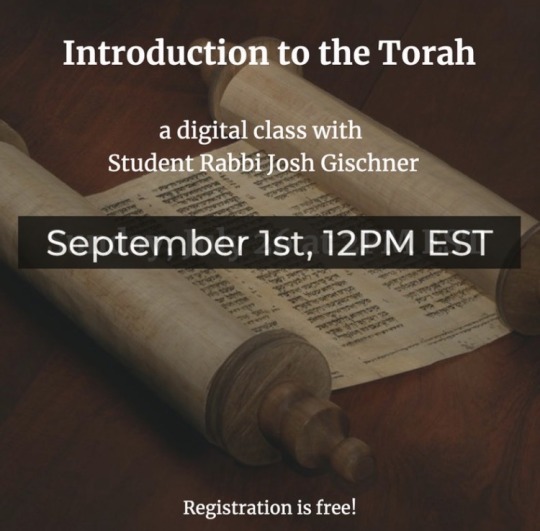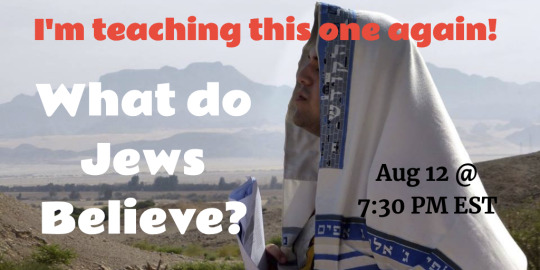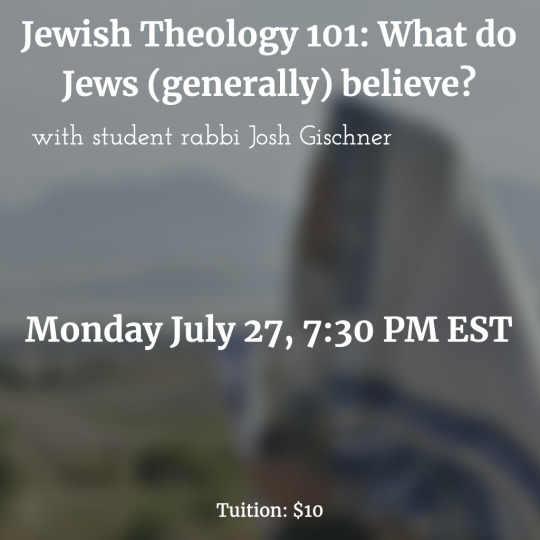Photo

Discussions around Jewish Mysticism, Hebrew video games, a homemade textbook, small group learning, and more will all help you to gain the skills to finally learn how to masters reading Hebrew!
This is how you will gain access to the prayer book.
Learn more here about the program, and financial and learning accessibility!
Two Choices for Class Time:
Monday Evening: (7PM-8:20 EST) Oct. 12th, 19th, 26th, & Nov. 2th
Register for Monday here.
OR
Friday Afternoon: (2 PM-3:20PM EST) Oct. 23rd, Nov. 6th, 13th, & 20th
Register for Friday here.
All are welcome!
326 notes
·
View notes
Text

“Introduction to Torah” an online class with student rabbi Josh Gischner
Tuesday, September 1st @ 12PM EST
Tuition: Free
Click here for course description!
172 notes
·
View notes
Note
Hey, I have a question! So I just started my intro to Judaism class, and I’m getting a bit ahead of myself, but I was thinking about Hebrew names. The thing is, my name is already Hebrew (it’s a very common biblical name). Would I still choose a new Hebrew name (eventually)?
((I don’t think it’s too early to start thinking about Hebrew names if it’s making you excited!)) It’s up to you! Some people with names that come from Hebrew retain that name as their new covenant name, or Hebrew-ize their existing name if it has a Hebrew origin - ie, Rebecca might become Rivka, Isaac might become Yitzchak, etc. Or you may find an entirely new covenant name! You have lots of options. Explore widely!
32 notes
·
View notes
Note
Ok this might be a weird question but how do you deal with eating kosher? I try hard to stay away from pork and shellfish, but so many foods that I share with my dad especially have one of those ingredients, and I’m really bummed that we can’t eat our favourite foods together anymore
This isn’t at all a weird question! Frankly I’m surprised it doesn’t come up more often. Personally I don’t keep a kosher diet. I don’t eat pork, but that has more to do with my personal ethics than Jewish observance. I share in the belief that feeding our bodies is a sacred act, and am working on small rituals and practices day by day to acknowledge that sacredness. It’s not easy, but I think that’s why developing a ritualistic Jewish relationship with food is worthwhile - because it’s such a challenge and demands so much of our mental energy if we haven’t been raised with that consciousness.
If you are converting with an Orthodox or similarly observant community, then observation of the laws of kashrut will probably be very important to your conversion. Outside of those communities, though, it will be up to you to negotiate your Jewish relationship with food. What is important to you about eating kosher? Is it about observing halacha? Is it about creating mindfulness in your eating habits? Is it about ethical eating? Is it simply that you think that eating kosher is a thing that Jews “do,” and you’re therefore feeling pressured to pursue it?
If you decide that observing the laws of kashrut is important to you, then you will want to work closely with your rabbi and your community to figure out how to make that significant transition in your lifestyle. I have no doubt that they will also be happy to work with you through the pain of giving up foods that make you feel close to your family. And I also have no doubt that you will be able to bring many wonderful new food traditions to your family, as well!
57 notes
·
View notes
Note
Can you be too young to convert? And, if you don’t mind me asking, why did you decide to convert? (sorry if that’s invasive, i’m just trying to parse my feelings toward conversion)
Technically, no (edit: another user made an important comment about the *legality* of giving minors religious education in the notes!!) - rabbis may want to hold off on actually converting you until you’re of legal age, but I have anecdotally heard about people converting before then. Mostly rabbis want to make sure you understand fully what you’re taking on and have the safety and support system you’ll need to do so. Children may also undergo conversion if their parents convert to Judaism. For minors who want to convert independent of their parents, I think that process is more individualized and specific to the rabbi they hope to work with. Individuals who are underage and unable to convert are still, I feel, as deserving as everyone else of asking questions and learning about Judaism if they so choose.
As for me - there’s actually a three part answer.
I decided to start learning about Judaism mostly because I was curious about Judaism. I was a sort of spiritual drifter and hadn’t spent any time learning about it. So I basically just popped into a rabbi’s office hours with some questions, he handed me a pile of books and told me to come to Torah study, and that was that. ((And yes, I am grateful to him beyond words, because he would have been well within his rights not to give me the time of day, and he took a chance on me and invested time and energy anyway. I recommend that people go into their first meetings with a rabbi with much more intentionality than I did!!))
I decided to start pursuing conversion studies formally because I was fascinated by Torah and by scholars like Moses Maimonides (the first Jewish text I ever studied was his Guide for the Perplexed, which is...not an entry-level text by any stretch of the imagination, but that’s why it was so good for me. It felt like a challenge, like - just how much do I have to learn before I could start to wrap my head around this even provisionally? And when can I start??). I was also going through something of a major rough patch (this was around 2016 and I’m American and trans, it suffices to say), and I found that Judaism has a lot of helpful tools for navigating strife and understanding human suffering.
I decided to actually become Jewish, in the end, because I really wanted to be Jewish. I love living a Jewish life. I love Torah. I loved my rabbi and my community (it broke my heart to move away from them last year). I love Jewish people. I love Jewish food. I love the richness, the challenge, the intellectual rigor, and the blessings that Jewishness brings into my life, and I love that Judaism provides tools that I can use to bring richness and blessings to the lives of others, as well. I want to participate in building and securing Jewish futures and raise Jewish kids and make Judaism more accessible and meaningful to current and future generations. In the end I just wanted to come home to my people and am lucky enough that they wanted me, too.
85 notes
·
View notes
Note
Hi, I was wondering if there's a certain point where it would be reasonable and acceptable for a (aspiring) convert to start trying to pray in the personal, 1-1 sense? I have been wanting to reach out to gd in that way but I'm unsure if it would be right for me to do so, as I'm not yet under the guidance or permission of a rabbi and don't want to overstep boundaries and partake in something that isn't meant for me.
My stance on prayer has always been and will probably continue to be that it is a 100% personal thing. Your relationship with the Divine is your business, and how you communicate with the Divine is your business, no matter your affiliation with a religious movement. Is it worth it to hold off on saying distinctly Jewish prayers until you’ve had the opportunity to study them and their histories and what they mean for Jewish people? Absolutely. So maybe it’s not the right time to start saying the Shema specifically, but if you feel it’s the right time to pray then no one has the right to withhold that from you.
34 notes
·
View notes
Photo
Spontaneous SYWC2J scholarship opportunity!!
If you are interested in attending this class and
do not have easy access to a Jewish community of learning (ie, live in a country without a synagogue, or cannot access a new community due to pandemic restrictions);
are interested in becoming Jewish;
are not already working with a rabbi toward conversion;
can not pay the class’s tuition yourself, either because of financial need or because you do not have access to online payment options,
please contact me via PM!! I can sponsor about 5 attendees for this class. (I’ll also be attending myself!)

I’m teaching this one again due to popular demand!
What do Jews Believe?
Wednesday, August 12 at 7:30 PM EST
Tuition $10
See more events here! See below for course description:
Keep reading
127 notes
·
View notes
Note
Can a nonJewish person learn about (& possibly believe in) the Kabbalistic Tree of Life, as long as they are not practicing anything?
Interesting question, and difficult to respond to. What do you mean by "can?" Are you asking permission, or are you asking if it's possible?
Either way, it's complicated. Also, either way, why would you want to? Kabbalah is like distilled, concentrated Judaism. I genuinely do not get why it's compelling for non-Jews who aren't interested in the rest of Judaism, and in being Jewish. I'm not trying to be harsh, anon, just honest.
From a Jewish perspective, you shouldn't study Kabbalah unless you are Jewish. Not just practice, but study. Kabbalah is mysticism, it's conceptual. It's about how we understand the world, ourselves, and the divine, through Judaism.
In that sense, it also... doesn't "work" or make sense outside the context of Judaism. If you aren't a religious Jewish person, who's established in life, educated about Judaism, and familiar with text study, you won't have the same experience with Kabbalah, because you aren't engaging with it in the way it's intended. Imagine like... listening to someone play a video game from the next room vs playing it yourself. Imagine in Crouching Tiger Hidden Dragon, when Jen surpasses Jade Fox in Wudan because Jade Fox couldn't read the training manual, and was only learning from the pictures. Learning Kabbalah outside Judaism is like that.
It's also something sacred, from a closed religion. It's not intended for non-Jews, so, studying, practicing, or valuing it as a non-Jewish person is inherently transgressive. It's taking it outside its context. It's cultural appropriation of a sacred thing.
Will there be Jews who disagree, who say that Kabbalah is for everyone? Sure. (Often, they're selling something.) However, you can't hold them up as token permission, because they don't represent the majority of Jewish opinion, and they're in violation of our rules and norms.
Can you just ignore what I said and just do some learning and dabbling to satisfy your curiosity? I can't stop you. Ultimately you're going to do whatever you think is best. But you should know that that isnt how Kabbalah works either - it's supposed to be a transmission of knowledge from teacher to student. Reading on the internet is not the same. And if you find someone willing to teach non-Jews, they're frankly either not Jewish themself, or they're selling out. Either way, they're not qualified, and they're delivering an inferior product.
Well, what about Kabbalah that's not Jewish? Christian Cabbalah? Hermetic Qabbalah? Honestly, there's no such thing. Those are both cultural appropriation, of the worst kind. Kabbalah is Jewish, and only Jewish.
You should also ask yourself why you're interested at all, and why you think that something from another culture and religion's closed practice should be available to you. With that in mind:
If you're really compelled by Kabbalah, you should consider conversion. If conversion to Judaism isn't for you, Kabbalah isn't for you either.
380 notes
·
View notes
Note
I understand the difference between Orthodox Judaism and the other branches, but I'm having a difficult time wrapping my head around the differences between Reform, Reconstructionist, and Conservative branches... is there a specific way to tell them apart, or do you recommend more research?
Oof, yeah, this is a tough one. There is a lot of slipperiness and grey areas between the non-Orthodox branches of Judaism in the US.
I wouldn’t say there’s one grand litmus test that will give you a sense of whether a Judaism you’ve been exposed to falls in the Reform, Reconstructionist, or Conservative “bucket,” so to speak. Reform and Reconstructionist are arguably more similar than Conservative is to either, although in my experience, Conservative Jews may come across as really Reform or, alternatively, may be a few kosher dishes away from practicing in a way that looks pretty much Orthodox. While learning about the major differences and similarities between branches can’t hurt, a better indicator of where you’ll best fit would be to visit as many communities as possible and talk to rabbis of different Jewish branches about the things that are important to you.
MJL has a quick and dirty breakdown on different Jewish denominations, and Forward ran a recent-ish article on the evolving relationship between Reform and Conservative practices.
49 notes
·
View notes
Note
Not an ask, but last thursday,after almost a year of considering conversion,I told my catholic mom about my decision to convert. I was so nervous because even though she's not really religious, i didn't really know how she'd react but she was super chill and supportive and I'm just so relieved and happy!!!
Yay!!! Phew, what a relief. Mazel tov!! To anyone else dreading this conversation, may it have as positive an outcome for you as it did for this anon!
21 notes
·
View notes
Note
I am hoping to convert conservative I found a synagogue about an hour away from where I may move to. The rabbi seems friendly. They're also lqbtq friendly is it "bad" that it's so far away? I would be willing to make the commute considering most of the other synagogues in the area are either Reform or Messianic. I was wondering if anyone had suggestions. Currently 1 hour from Chicago, IL USA where everything is very far. I am willing to relocate for the right community and Rabbi.
I don’t think it’s “bad” by any means, especially if you’re willing to put in the time and effort to commute - I don’t *believe* that most Conservative rabbis will require that conversion students live close to the synagogue, but that would be something to take up with them, I’m guessing?
3 notes
·
View notes
Note
hey! i'm starting to be seriously interested in conversion and i'd like to ask you a question: is it okay for a person who only started converting to wear a star of david necklace? or are they reserved only for jews who finished this process? sorry if i was disrespectful!
While this is something that will really be between you and your rabbi, I think the general consensus is that you should wait to wear obvious Judaica until after you have started formally converting and had that conversation with someone who can help you really understand the meanings and implications of the symbols you’re identifying yourself with. However, you might consider finding a Magen David you like so you have something to look forward to!
17 notes
·
View notes
Note
I’m interested in converting to Judaism, and I know the natural first step would be to go to a synagogue for Shabbat services, but everything is closed. I’ve already reached out to a local rabbi through a Jewish friend and am waiting for her to get back to me; would it be a bad thing if I started trying to learn Hebrew and educate myself on the culture, beliefs, and holidays in the meantime? I don’t want to place myself where I’m not wanted, I just want to learn.
That is not at all a bad thing! Trying to find the resources to study for conversion is challenging enough as is; I can’t imagine trying to work through it all in the middle of a pandemic. Keep your head up and feel free to come back to this space and/or PM me if you need to talk!! You’re also welcome in the Torah study Discord :-)
If you need a book rec, try Settings of Silver by Stephen Wylen! It’s widely accepted as a good crash course into a lot of what you mention in your ask and is very accessible.
49 notes
·
View notes
Note
may i join the torah discord if i am merely considering converting? i don’t wish to encroach on any safe spaces (: !
Yes, you may!!! The Discord is open to anyone who wants to learn more about Torah and about other Jewish texts, practices, and discourses.
15 notes
·
View notes
Photo

“What do Jews believe?”a digital class with student rabbi Josh Gischner
Monday, July 27, 2020 @ 7:30-8:10 PM EST. Tuition: $10 - Register here today!
This class will be radically inclusive, and open to everyone regardless of their connection or non-connection to the Jewish Community! We are here to learn. Please invite your friends.
See below for class description.
115 notes
·
View notes
Note
Hello! I was wondering if you had any words of wisdom or advice for getting over the sadness of knowing that a good portion of Jewish people, Orthodox, won’t see my conversion as valid. I truly believe in the branch I am converting into, but knowing this does break my heart a bit and makes me feel like I will never truly be Jewish even after I finish my conversion :(
I can understand why you’d be worried about this, but I don’t think it’s fair to lump all Orthodox Jews under this opinion. I have interacted with plenty of Orthodox Jews, both online and in person, who have never treated me as anything less but fully Jewish - even if I live a Jewishness that often looks very different from theirs!
I think it might be worth it to sit and decide why you feel it’s Orthodox Jews who get the final say in the validity of your Jewishness. Is that a fair assessment? Where does that assessment come from? And, given that you love the Jewish branch you’re converting into - why does it matter what other branches institutionally may think about your Jewish journey? Your Jewishness is contextual and community-specific. Your community will welcome you with open arms and consider you part of the family. No one else gets to weigh in on that.
I do know how you feel. It makes me sad to know that there are Jews in America that don’t consider me part of their family - because I certainly consider them to be part of mine. I am concerned about their welfare and I feel that we share a soul with our people, even if they don’t feel the same way. One-way relationship are always painful. But I am holding as much grace and love for those folks as I can, and understanding that their dismissal of me, while hurtful, is not without cause, and that cause makes sense to their world, even if it doesn’t make sense to mine. b”H we can understand one another better in the future, and welcome each other as part of the same wide, wonderful family. And my decision to hold onto them, even if they won’t hold on to me, actually makes me feel more fully realized in my Jewishness. I feel that I am being my best Jewish self when I choose to hold space for a reality where we all stand in unity with one another, not in spite of our differences but in celebration of them - how wonderful that we are all here to fill the world with our own distinctive Jewish joy!
29 notes
·
View notes
Note
So I’ve been turning over contacting a rabbi about conversion in my head for a while now, but I’m not even sure at this stage what “stream” of Judaism I want to convert under. Is it in bad taste to contact several rabbis at the beginning of the process, or should I wait until I’m firmer in my path?
I would be exploring as many areas of the Jewish world as possible right now, especially if you haven’t found a particular tradition or “stream” that really calls to you! It’s not at all in bad taste to speak to several rabbis - in fact, they’ll probably appreciate you doing your research!
15 notes
·
View notes